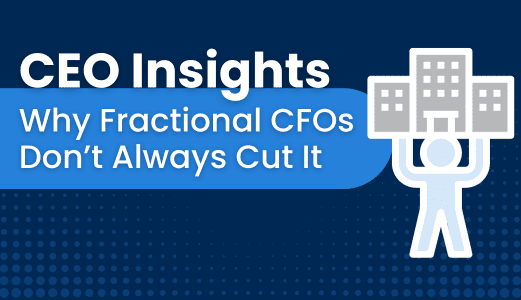Building a finance team?
Rapidly growing companies have many competing priorities and experience continuous growth pains. One of the biggest struggles that high growth CEOs and Founders face is how to best build their teams. CEOs and Founders juggle many priorities, making it difficult to know when to hire the right talent to successfully scale-up, and what the hiring skill sets should be.
Once a growing company achieves certain milestones, like reaching $5M in revenue, closing their Series A fundraising, or planning to go public, CEOs and Founders need to start investing in a CFO or senior finance talent. Especially if they don’t have the expertise themselves, or already have access to a Fractional CFO.
In our latest report, How Finance Fuels Growth, we provide an organizational chart for CEOs, Founders and finance leaders at technology and SaaS companies for building a finance team by revenue stage. This invaluable tool steers high-growth companies on the right track to building a finance team that will fuel their growth. Although every company is different, there is consistency in terms of how the most successful growth companies hire.
Read on as we explore four factors that CEOs, Founders and finance leaders need to consider when they are building the right finance function to scale up.
The 4 Critical Factors for Building a Finance Team
Factor 1: Should You Hire to Build, Fix or Maintain?
Current pain points are often the primary motivator for hiring. It is important for Founders, CEOs and finance leaders to determine if the goal of hiring is to build, fix or maintain your current people, process and system issues.
When diagnosing a pain point, leaders need to map out the company’s major upcoming events and annual cycles to determine if the current organizational design will meet their short and long term goals. Is finance’s mandate to focus on raising money? To build out KPIs? Or reach SOX compliance to go public in the US? What type of human resources do you need to attract when building a finance team?
Take the example of a company that’s in the middle of their financial reporting season. Though they may be struggling through the reporting period, does it make sense to hire another accountant permanently to help? What if the company was a few months away from trying to secure a Series B financing round, and they’ll eventually need a financial analyst to help prepare for this milestone?
Finance leaders need to find the right balance between hiring for their short term pain points in order to maintain operational efficiencies, and to make the right strategic hires to push the company’s broader agenda forward.
Factor 2: A Company’s Revenue Model Influences the Finance Structure
Revenue complexity is another wrinkle that needs to be factored in by finance leaders. Depending on the volume of transactions, variability across clients, industry and revenue recognition, as well as geographies and product lines, accounting can be simple or exceedingly complex to manage.
For many SaaS companies, observing revenue through the lens of traditional metrics doesn’t always tell the whole story of their business needs and what type of talent is needed for building a finance team. A company may be generating less than $10 million in annual revenues, but may have a global footprint with multiple office hubs and employees across time zones. With this level of complexity, a sophisticated finance operation is needed to navigate the local regulations and clients.
In contrast, some companies see most of their revenues come from a small group of very large clients, the majority of which may be billed annually. That makes accounts receivables (A/R) simple to manage and less of a priority to hire for. However as the company grows, more robust accounts payables (A/P) and compliance support will be needed to manage the complexity, especially if their clients are scattered in different countries.
Factor 3: Common Hiring Traps
Our recruitment teams constantly encounter hiring managers who want to hire people that have similar skills and backgrounds to them. For example, a CFO that comes from an accounting or controllership background may want to hire a Senior Financial Planning & Analysis Manager sooner than needed. This could work in the short term, but eventually the approach will backfire, as the key finance skills needed to grow the business will go unfilled until a crisis hits.
Another hiring pitfall is that some finance leaders may be thinking too far into the future by hiring ahead of what is needed. Hiring for the future is always wise, but in a high growth environment, current needs and pain points cannot be overlooked.
Factor 4: Weighing Technology vs. People
Invest in technology or invest in people? Implement a finance automation tool to automate your A/P or A/R? Or hire an AP/AR clerk?
Limited budgets mean that finance leaders can’t necessarily invest in both people and technology at the same time, so the strategic direction of the business impacts what building a finance team will look like. In high-growth environments, processes are constantly evolving, and it can be tricky to introduce automation technologies that are meant for more stable business environments.
Technology can improve the finance team’s productivity; it doesn’t replace them. With how quickly high-growth companies change, finance leaders need to weigh the ROI of implementing new technologies that create efficiencies or hiring the right people who can juggle many tasks.
Learn When and What to Hire For in Our Latest Report
In our latest report How Finance Fuels Growth, we provide an organizational structure of the finance team and the roles you should hire for at various revenue stages.
Other reasons why you need to download this report:
- Read advice from Canada’s leading CEOs, Founders and CFOs on achieving breakout growth
- Get tips on identifying pain points that are slowing down your growth, and how to resolve them
- Understand the finance needs and key differences between the start-up, scale-up and enterprise growth stages
- And more…




